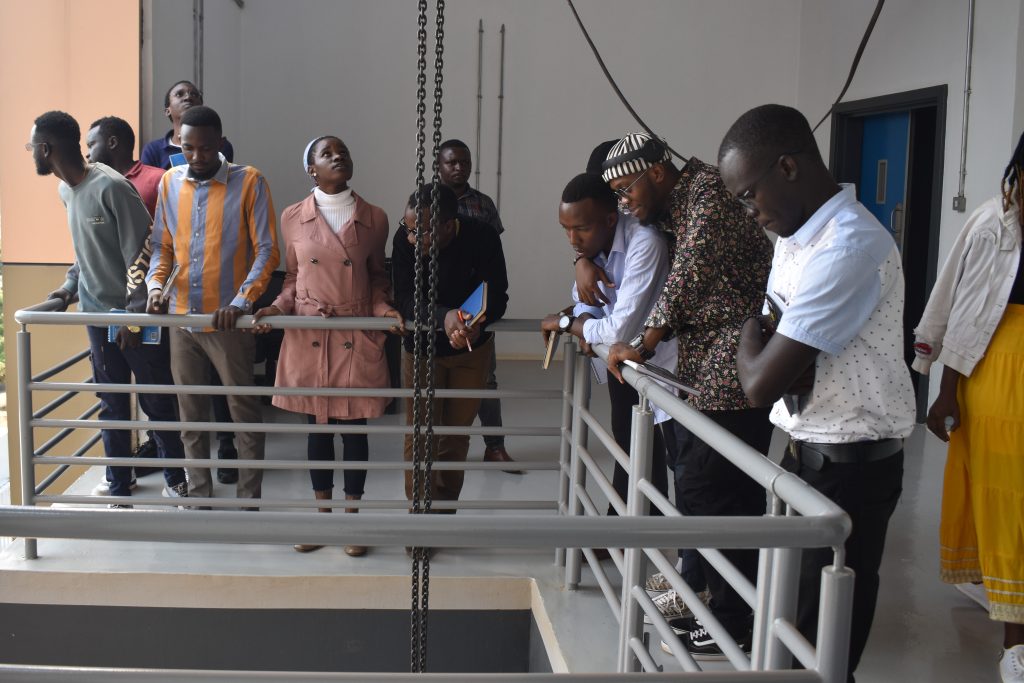By Asenath Were
As Sathya Sai Baba puts it, knowledge that is not put into practice is like food that is not digested. The education system today is becoming more and more complicated because of industrial expectations.
Most employers are hesitant to hire university graduates because many have theoretical knowledge but lack practical experience. This is because of the extensive theoretical classes students have throughout their study time. The partnership between Uganda Christian University (UCU) and MTN Uganda seeks to educate and prepare UCU BSCS students.
Daniel Katerega, an engineer by profession and lecturer at UCU under the department of technology, explained that the institution makes sure that its students have the necessary exposure and hands-on experiences while still in school.
On February 27, Katerega led a team of students to Mutundwe MTN’s data center for the field experience. The UCU-MTN partnership is to ensure that students are equipped with the right skills to be deployed in the real world.

“Our main goal in bringing the students is to see what they learn in class applied in a real-world work scenario, particularly with the large number of technology internet subscribers that we have in Uganda from service providers like MTN.” Katerega said.
Katerega remarked that as UCU, they plan to maintain the relationship between MTN and the university. It will also see UCU students doing their internship training at MTN Uganda to improve their skills and the practicability of their classroom knowledge.
Mary Frances Aketch, a student of computer science in her final year, wants to become a network administrator. According to her, the field trip to MTN was very helpful.
“I had only interacted with some of these devices, switches, and routers using the simulation, and that is the Cisco Packet Tracer, so being able to see what the routers look like and being able to learn more from the person who is already in the field and being here was really so helpful.” She said.
Aketch commented that at school, they only interact with the packet tracer and YouTube videos, which is not the same as getting to see them physically, so going to MTN Uganda has made Aketch’s desire of becoming a network administrator more realistic.
She commended the university for such an arrangement and requested that such a program be offered consistently because of its impact on the students. “When you are configuring and practicing, sometimes you do not really have a picture of the device.” She said.
To Nathan Kasongo, a Computer Science student in year three, this has been productive; he has learned more of what he was taught in his internship and more of the applicable stuff than the theory they have been studying.
“This has provided a better platform for knowing what we have been doing in the theory bit and what we have done in the internship so that when we are going into the working world, we know what to implement.” Kasongo said.
Kasongo wants to be a networking engineer, and according to him, this has opened him up to what he is going to need to add on—that is to say, conduct more research about it to add on to what he already knows to fulfill his dream.
Herbert Nyakojjo, the senior IP specialist at MTN Uganda, stated that a student who gets to see the practical side of what they are studying appreciates it since it helps amplify the theoretical knowledge gained in class.
“A student who gets the opportunity to see this appreciates it, for in most cases, in schools, it is purely theoretical knowledge, so when someone has this kind of practical knowledge, it helps them understand what they study better.” Nyakojjo said.
Nyakojjo stressed that it is important because not only do the students get to practice, but they also get to know how MTN Uganda operates since many people consider networking companies to be some kind of mobile agent in town, but it is beyond that.
To him, there is a lot that takes place behind the SIM card; therefore, having students over is a great thing, and he hopes this is an eye opener to other universities because these students will be the ones in charge of the systems tomorrow, hence the need to begin preparing them for their career journey.
The massive gray building that caught my attention was filled with a complex network of wires interconnecting various systems, making it a fascinating sight to behold. While there were no signposts to indicate what lay inside, it was clear that this was no ordinary office or conference building commonly found in downtown Kampala. The intricate web of wires running from one system to another was a testament to the advanced technology housed within the structure, making it a sight to behold for anyone with an interest in modern engineering and design.
The rooms are so cold and filled with so much noise that you cannot hold a normal conversation without raising your voice. The tour guide, Herbert Nyakojjo, had to keep raising his voice to be heard above the noise.


